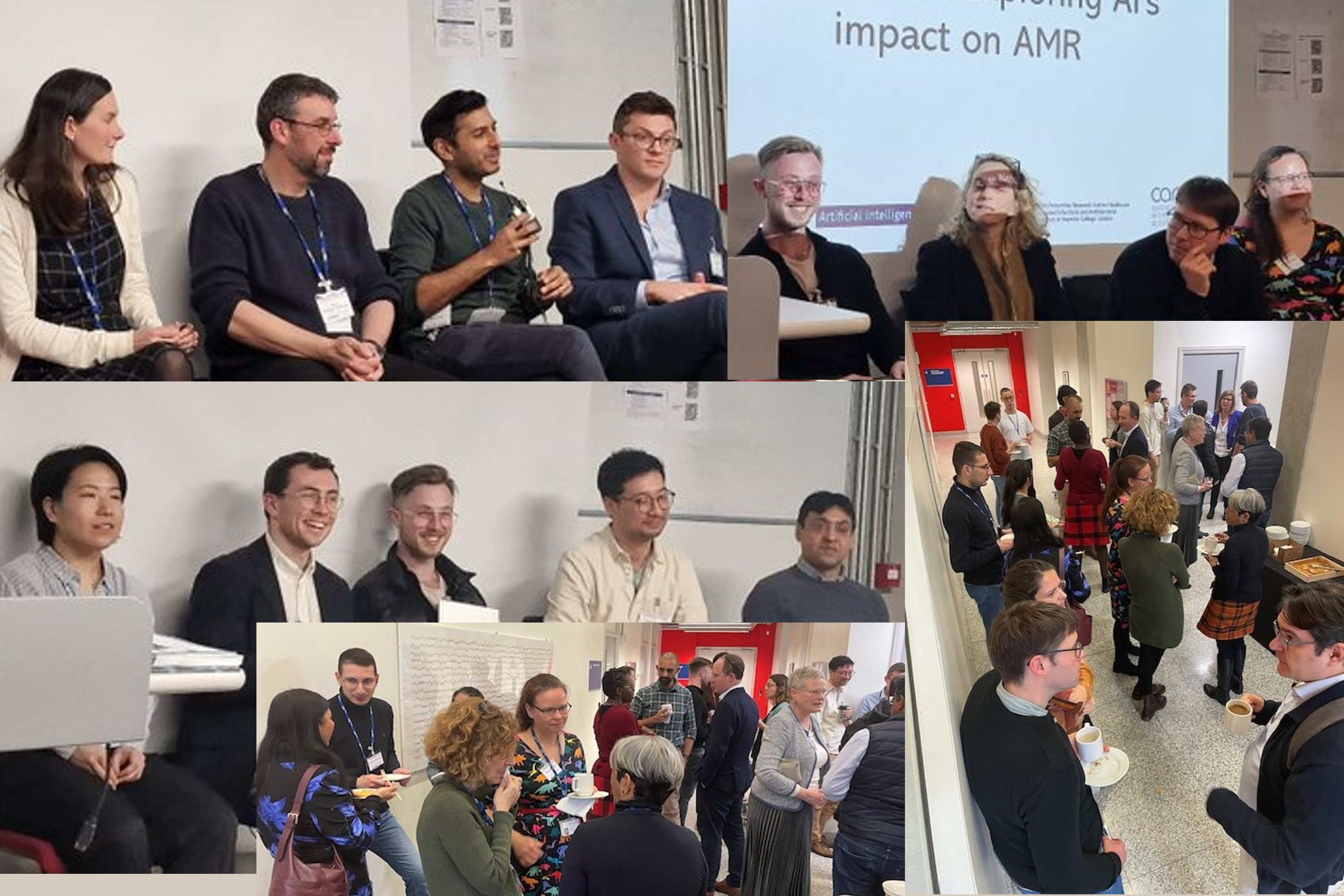Event summary: Impact of AI on AMR - February 2024
Read about the event "Impact of Artificial Intelligence on AMR", which explored the impact of AI in research and practice on AMR, including common themes and challenges.
Imperial researchers across faculties are developing and deploying new technologies to address AMR. Innovations include wearable technologies, machine learning for decision support, biosensors for dose optimisation, data-driven multiplexing, and drug resistance prediction. 
Researchers in this field include:
- Dr Rossella Arcucci: Data assimilation ± machine learning
- Professor Darius Armstrong-James: AI-based multi-omic analysis
- Dr Pedro Ballester: AI for phenotypic virtual screening, AI for drug lead optimisation, chemical space exploration
- Professor Mauricio Barahona: AI and machine learning for healthcare-associated infections
- Dr Gabriel Birgand: Machine learning for hospital-acquired infections and AMS
- Will Bolton: AI-based clinical decision support for antibiotic optimisation and stewardship
- Professor Leonid Chindelevitch: Molecular and population mathematical and computational modelling of AMR
- Professor Graham Cooke: Project using real-world decision support systems to improve patient outcomes
- Dr Nick Croucher: AI methods to complex genotype-phenotype relationships
- Professor Aldo Faisal: Data-driven methods from machine learning & stochastic modelling techniques
- Professor Anthony Gordon: Using AI to develop personalised medicine in sepsis
- Dr Bernard Hernandez Perez: Developing and implementing Clinical Decision Support Systems
- Professor Alison Holmes: AI for antimicrobial optimisation
- Dr Elita Jauneikaite: Implementing AI predictions of AMR to bacterial surveillance and outbreak investigations
- Dr Damien Ming: Clinical decision-support for the management of infection
- Dr Tim Rawson: AI-based precision antimicrobial prescribing and dose optimisation
- Dr Jesus Rodriguez Manzano: Machine learning approaches to enable accurate high-level multiplexing in conventional real-time instruments and state-of-the-art digital PCR platforms
- Professor James Seddon: AI reading of paediatric chest x-rays for child TB, integrating clinical, radiological and omics data for child TB diagnostics
- Dr Anand Shah: Machine learning and AI to unlock unstructured electronic health records, understand disease phenotypes, and identify patients for stewardship intervention
- Dr Matthew Siggins: Explainable machine learning in biomarker design
- Dr Valerie Soo: Machine learning for genotype/phenotype relationships in the evolution of antimicrobial resistance
- Mr Richard Wilson: AI-based clinical decision support software for antimicrobial precision prescribing
- Professor Sophia Yaliraki: AI to explore chemical space
- Dr Nina Zhu: Inequality in AMR burden and infection care quality through data
Relevant Centres and Networks
NIHR Health Protection Research Unit in Healthcare Associated Infections and Antimicrobial Resistance: The HPRU in Healthcare Associated Infections and Antimicrobial Resistance is a partnership between Imperial College and UK Health Security Agency. It brings together researchers from a range of disciplines and professions (including doctors, engineers, epidemiologists, microbiologists, pharmacists, behavioural scientists, economists, and nurses) to address the threat of AMR and healthcare-associated infections. It focuses on four themes: 1) Priority pathogens, 2) Precision prescribing, 3) Practice, design and engineering, and 4) Population health and policy.
The Centre for Antimicrobial Optimisation (CAMO): CAMO brings together innovative, multidisciplinary research to optimise antimicrobial use and sustain the effectiveness of these drugs in the face of increasing antimicrobial resistance and the absence of new treatments. Research focuses on: 1) development of rapid diagnostic solutions, real-time biosensor technologies to monitor antimicrobial concentrations, and 3) using artificial intelligence and machine learning to assist with infection, detection, diagnosis, clinical decision-making.
Centres for Antimicrobial Optimisation Network (CAMO-Net): CAMO-net is a unique global research partnership which aims to address the global impact of antimicrobial resistance on human health by fostering research partnerships across low, middle, and high resource settings and across urban and rural environments.
Artificial Intelligence Network: Imperial’s AI Network provide an inclusive, holistic answer to how AI can help solve our planet's major challenges. It runs the UKRI Centre for Doctoral Training in AI for Healthcare and EPSRC CDT in Smart Medical Imaging.
